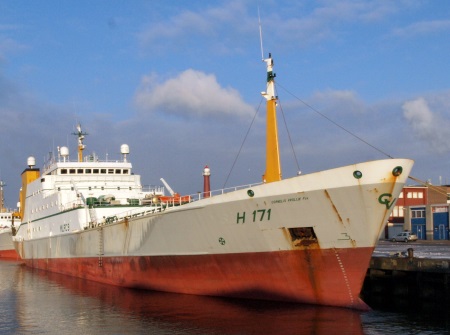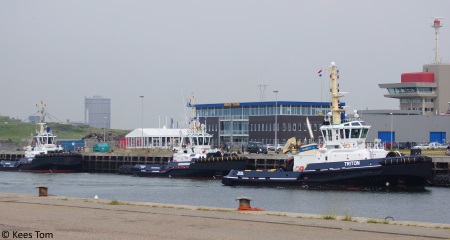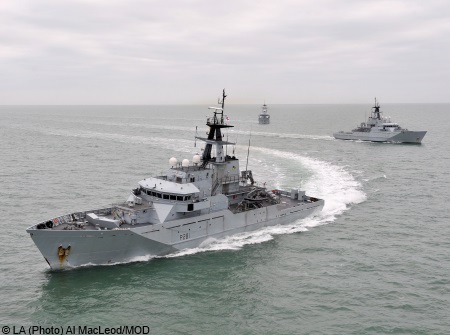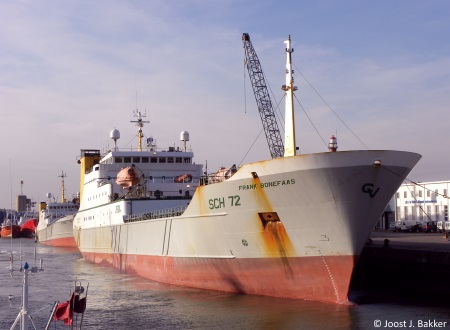
Date: 2024-11-21 Page is: DBtxt003.php txt00014960
Fisheries Resource Management
EU Common Fisheries Policy
The Dutch-owned Cornelis Vrolijk had the right to catch 18% of England’s fish, but this has recently been increased to 23%.
Burgess COMMENTARY
Peter Burgess
Cornelis Vrolijk – The Trawler which Catches 23% of England’s Fish

Cornelis Vrolijk
The Dutch-owned Cornelis Vrolijk had the right to catch 18% of England’s fish, but this has recently been increased to 23%.
In November 2014 the British media reported that a single Dutch trawler, the Cornelis Vrolijk, had the right to catch 23% of England’s entire fishing quota (1). To put this into perspective the entire small inshore fishing fleet for the whole England is given 4% of the quota. Built in the Netherlands in 1988 the Cornelis Vrolijk is a pelagic trawler which specialises in catching mid-water species such as mackerel, sardines, blue whiting and herring. It is 114 metres in length and displaces over 5500 tons (2), making it easily the largest fishing vessel in the UK-based fleet and it has the ability to process, freeze and package its catch on board. Although the Cornelis Vrolijk sails under a British flag and has Hull as its homeport it is ultimately owned and operated by a Dutch company.
Defra
Defra and the government have come under pressure to explain who gets UK quota.
The news that the Cornelis Vrolijk could catch a huge proportion of England’s fish only emerged as conservation charities placed pressure on both national governments and the European Union to be more transparent about how quota allowance was worked out, and explain exactly who was awarded quota to catch fish in the waters of the UK. When Defra (Department for Environment, Food and Rural Affairs) first published the exact details of the full quota register in late 2013 the figures revealed that the Cornelis Vrolijk alone had 18% of the quota, and by 2014 the new set of figures released revealed that this had risen to 23% of the quota.
It was also revealed that while the Cornelis Vrolijk fishes off a British quota the vessel lands all of its catch in the Dutch port of IJmuiden (1). The company which owns and operates Cornelis Vrolijk responded by saying that they paid taxes in the UK and provided employment to British fishermen.

IJmuiden Port
Despite fishing off a British quota the Cornelis Vrolijk lands its catches at IJmuiden Port in the Netherlands.
Other worrying news emerged about foreign vessels operating in British water. In 2010 the Spanish owned trawlers O Gentia and Coyo Tercero were fined a total of £1.62 million for illegal fishing. Coyo Tercero was stopped by the Royal Navy fisheries protection vessel HMS Tyne and found to have 500kg of salted ling on board which were not recorded in the logbook while O Genita had been involved in illegal ship-to-ship transfers of fish at sea in an attempt to avoid quota restrictions (3). Danny Poulding of the Marine Management Organisation which led the prosecutions stated in 2010:
“This company systematically abused the quota system for significant and unfair financial gain, threatening the future sustainability of an already vulnerable fish stock and impacting on the businesses of legitimate fishermen by flooding the market with cheaper fish (3).“
However, the news released in 2013 revealed that despite its past crimes the O Genita still had a large quota to fish in UK waters – clearly serious breaches of UK and EU fishing laws are no barrier to being rewarded with quotas in the future.

HMS Tyne
The vessels of the Royal Navy’s Fisheries Protection Squadron (HMS Tyne, pictured in the foreground with HMS Mersey and HMS Severn behind) were responsible for discovering the illegal fishing of the Spanish vessels, and the illegal catch on board the Dutch-owned super-trawler the Frank Bonefaas.
In March 2015 further news emerged of illegal fishing in British waters. The Frank Bonefaas – a 120m super-trawler which is owned by the Cornelis Vrolijk company – was caught by HMS Severn with an astonishing 632,000kg (1,400,000lbs) of mackerel on board – all of which had been caught in a protected area off the Cornish coast (4). Despite the catch being worth an estimated £437,000 (although some reports claim that the amount of mackerel on board would have, in fact, sold for around £750,00) it was not confiscated from the boats owners, and they were instead allowed to sell it and fined just £97,000 plus £5,000 costs, meaning that their illegal operations had been very worthwhile indeed (4). The Marine Management Organisation (MMO) which brought the prosecution against the Frank Bonefaas and the Cornelis Vrolijk parent company revealed that the court had the power to set the fine at the same level as the value of the catch, and the MMO had invited them to do so, but the court had chosen not to (5).

Frank Bonefaas
The Frank Bonefaas illegally caught 632,000kg of mackerel in a protected area off the Cornish coast, but was allowed to keep and sell its entire catch.
The news has led to concerns over how much of Britain’s fish stocks are being exploited by foreign-owned vessels. While Defra maintain that all fishing vessels operating in UK waters have to show an economic link to the UK, the reality remains that one-third of the UK quota is landed overseas and there are over thirty Spanish-owned trawlers which operate under British flags allowing them access to British fishing quotas (6).
While the quota allocation of Britain’s fish stocks has been shrouded in secrecy the pressure to reform to Europe’s fisheries led to Defra releasing detailed information about quotas and has finally allowed the dominance of certain foreign companies to be made public. There is massive concern that these companies take far more than their fair share of the UK fish stocks and offer little back in terms of support to coastal communities and the British fishing industry in return. Many anglers, conservationists and commercial fishermen may struggle to understand why a single foreign vessel can catch 23% of England’s fish, and why another vessel which has been found guilty of serious illegal fishing in UK waters still has the right to UK quota.
While Britain remains a member of the European Union and signed up the Common Fisheries Policy there is limited ability to change the current situation. However, in a historic referendum on 23rd June 2016 the people of Britain voted by a margin of 52% to 48% to leave the European Union. At the time of writing [September 2016] it is unclear how this will change Britain’s ability to control its own territorial waters and fisheries, but pro-Brexit campaign groups believe that Britain now has the change to reform UK fisheries to be more productive and sustainable and remove many of the destructive practices of the Common Fisheries Policy (7). If this is the case then preventing destructive fishing and stopping super trawlers such as Cornelis Vrolijk from operating in UK waters will surely be a priority.
In late summer 2016 it was also announced that the Cornelis Vrolijk fishing company had agreed to collaborate with Greenpeace over fishing more sustainably. The agreement would see the Cornelis Vrolijk fishing company refraining from fishing in as yet unfished arctic waters and work to fish more sustainably in African waters (8). It remains to be see how this will work in practice and if it will limit Cornelis Vrolijk catches in European waters.
=============================================================================
References:
EU Lets One Dutch Ship Net A QUARTER of England’s Fishing Quota – The Daily Mail, 5/11/2014
Cornelis Vrolijk – Shipspotting.com
HMS Tyne Nets Record Breaking Catch – www.gov.uk
Dutch Trawler Allowed to Keep £437,000 Illegal Mackerel Haul – www.thetimes.co.uk
Cornelis Vrolijk Allowed to Keep, Sell Mackerel Caught Illegally in UK Waters – www.undercurrentnews.com
Spain’s Fish Barons Cash in on UK Stocks – The Sunday Times, 17/06/2013
Reality Check: How Would Brexit Affect the UK’s Fishing Waters – BBC News.
Dutch Pelagic Giants Sign MoU with Greenpeace – www.undercurrentnews.com
Note: This article was originally written in January 2013 when the Cornelis Vrolijk had 18% of Britain’s fishing quota and was re-written in November 2014 to reflect the fact that the vessel now has 23% of the quota.